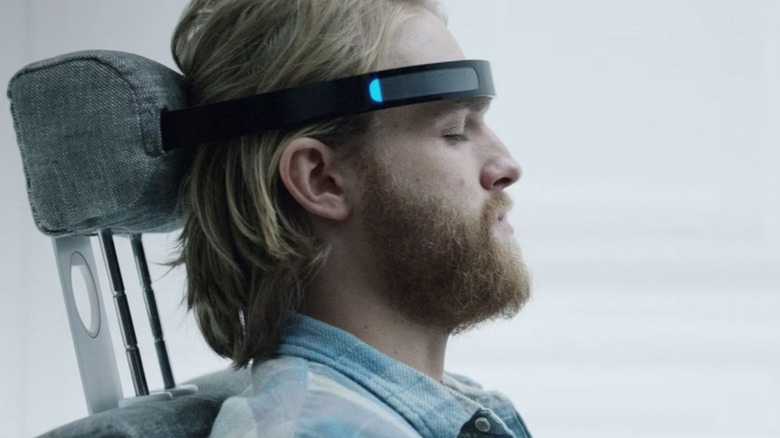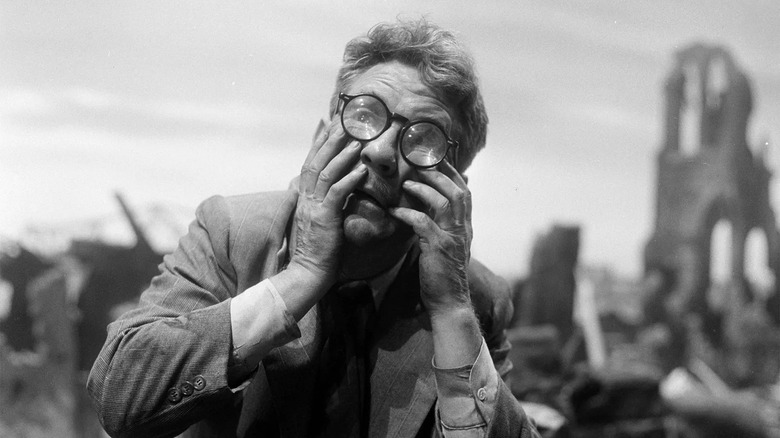The Ending Of Black Mirror's Playtest Was Inspired By A Critic's Tweet
Most "Black Mirror" episodes have some sort of larger point behind them. Episodes like "White Bear" or "15 Million Merits," while entertaining in their own right, also have a lot of grand statements to make about human nature and the way technology can potentially enable the worst parts of it. But sometimes they throw in an episode like "Playtest," with tells a story with little to say except, "Hey, wouldn't it be super messed up if this happened?"
The big twist of the episode is that all of the main character's experiences inside the AR experimental game, which from his perspective lasted several days and became increasingly deranged near the end, only lasted about .04 seconds inside his head. He'd gotten a call from his mother at the start of the procedure, and that was what killed him. It's a cruel, ironic fate, considering that he'd been ignoring his mother throughout the whole episode and was haunted by the guilt of this the whole time. "Black Mirror" has often been criticized for having simplistic "phone bad" themes, and this episode certainly didn't help: the main character here was quite literally murdered by his own phone.
This wasn't an accident, however. When talking about the episode in a 2016 interview, Charlie Brooker talked about how the final twist of "Playtest" was inspired by a tweet complaining about exactly this issue. "There's a funny criticism of 'Black Mirror' from Mallory Ortberg who wrote, 'Next on 'Black Mirror:' What if phones, but too much?' And I thought: 'Right, that's what I'm going to do. Let's do that episode!'" The result was one of the show's darkest episodes, one that revolved around a single tragic phone-related punchline.
Following along an old tradition
Still speaking about "Playtest," Charlie Brooker explained, "In my head, it's like a classic 'The Twilight Zone' punchline ending, like 'To Serve Man.' So hopefully people see the humor in that." The "Twilight Zone" episode he's referencing is the one where the twist relies on a silly pun: the human characters realize that the aliens' book titled "To Serve Man" doesn't refer to helping mankind, but cooking them. It's one of the most memorable episodes of the series, parodied on later shows like "The Simpsons" and "Buffy the Vampire Slayer."
But maybe the best episode of "The Twilight Zone" to compare "Playtest" to is the season 1 episode, "Time Enough at Last." This is the one where a bookish guy survives the apocalypse, finds an untouched library, and rejoices in the fact that he'll finally have all the time in the world to read books, a pleasure that's been denied to him throughout the first half of the episode. It almost sounds like a happy ending, but then the guy accidentally breaks his glasses. Now he can no longer read, and there's no one in the world left to help him out. "To Serve Man" had a dark ending, but the final twist of this episode is just plain mean.
It's hard not to see echoes of "Time Enough at Last" in "Playtest." Both episodes center around a guy who never commits any serious sins, but is nevertheless punished severely in the end. Each episode's conclusions also function as the punchline to a long-winded joke, one that might take a while to properly settle in. In its best moments, "Black Mirror" and "The Twilight Zone" both understand that sometimes a situation is so bleak, so horrifying, that all you can really do is laugh.

